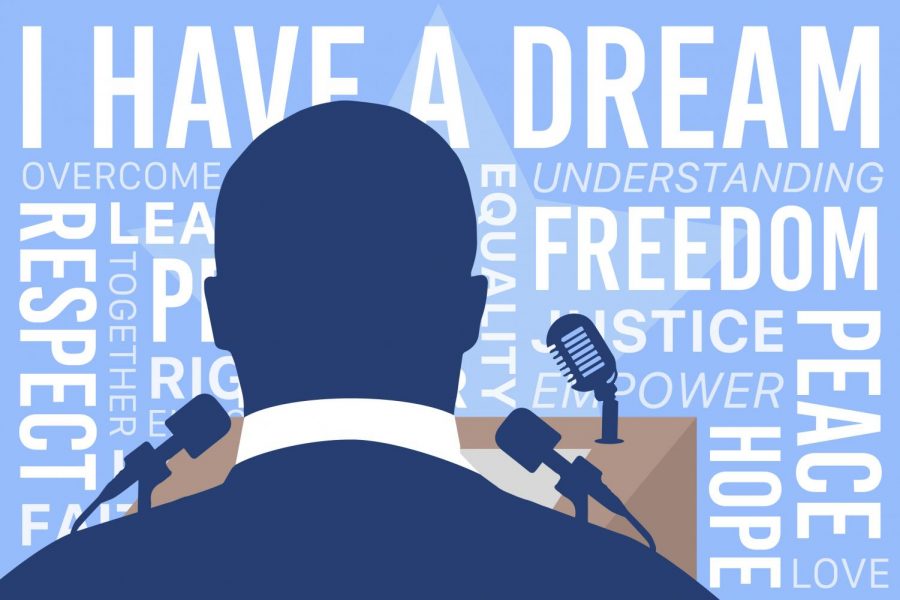Column: Martin Luther King Jr.’s legacy lives on, emphasizes nonviolent protests
In an image created by graphic designer and senior Mark Chrissan, the silhouette of Martin Luther King Jr. stands before a podium surrounded by words that represent his campaign of activism. In the attached piece, Editor-in-Chief and columnist Grace Williamson challenges readers and activists against discrimination to remember the words of Martin Luther King Jr. “We have no alternative but to protest,” King said. “For many years, we have shown an amazing patience. But, we come here tonight to be saved from that patience that makes us patient with anything less than freedom and justice.”
Every year students return from winter break to the long dreary days of January. However, to teachers and students alike, January’s third Monday provides a day to rest from school — thanks to Martin Luther King Jr. Although he is mentioned in history textbooks, Martin Luther King Jr. deserves a federal holiday. The accomplishments from his life are still seen today. Museums, theatres and virtual programs will commemorate King in the Dallas/Fort Worth area Jan. 17.
Martin Luther King Jr. was a major leader in the 1960s civil rights movement to desegregate America. He was not only a Christian theologian but an advocate for peaceful protesting. After leading a march on Washington, D.C. for civil rights, he received a Nobel Peace Prize in 1964.
King believed that peaceful protests are the only true path to change, and he organized several protests and marches with the intent of nonviolent activism. In 2020, the Black Lives Matter movement faced a nation-wide revival, which some have compared to the equality movement led by King in the 1960s.
Despite now having monuments, streets, statues and a federal holiday dedicated to him, King was once considered a national security threat to the U.S. government. The FBI even surveilled him for evidence of Communist influence. Parts of the government feared he would unite Black nationalists and wreak havoc in America. In the Black Lives Matter movement of 2020, similar fears of protestors having ulterior motives circulated. However, while King broke down de jure (legalized) segregation, the BLM movement works toward collapsing the culture of de facto (personal-biased) segregation.
Direct comparisons of civil rights protests can be drawn to 2020 from as early as the 1950s. The powerful peaceful protest of the 1955 Montgomery Bus Boycott that sparked the desegregation movement and the on-going Black Lives Matter movement, which took national news in 2020 can go hand-in-hand in terms of civil rights movements. In fact, it can be argued that the Black Lives Matter movement is just a revitalized and continued effort from what King and other Black leaders began more than 60 years ago. The bus boycott began with just one woman, Rosa Parks, who refused to give up her seat despite the segregation policy, while the BLM movement, already initiated, seemingly grew exponentially after the murder of just one man — George Floyd.
Each of these historical events for the U.S. sparked from the impact of one individual and united a sea of supporting Americans who called for action. Throughout his life, King consistently preached peaceful protesting as the key to change. While the Black Lives Matter movement has struggled with forms of violent interactions, the inspiration to remain true to the cause through determined, yet kind, protesting remains. This Martin Luther King Jr. Day, activists against discrimination in America should remember his words on protesting in Alabama, Dec. 5, 1955. “We have no alternative but to protest,” King said. “For many years we have shown an amazing patience. But, we come here tonight to be saved from that patience that makes us patient with anything less than freedom and justice.” Although King knew the path to equality was through protesting, he never stopped advocating for a hopeful and nonviolent movement.
While racism and prejudice are still fought against in today’s America, Martin Luther King Jr. led the march to prohibit legal segregation in the 1960s. Now, in 2021, King’s powerful words live on with events held around the country to honor his memory this year.
Your donation will support the student journalists of Prosper High School. Your contribution will allow us to purchase equipment and cover our annual website hosting costs.








![Freshman Polly Greaves created this updated version of the original graphic through Canva. Their next episode reviews a science fiction novel, 'Ender's Game.' "I feel like [Orson Scott Card] did a really good job incorporating feelings into his words and the plot," Greaves said, "which really made it a work of art because I believe that good books are books that can make you feel something."](https://eaglenationonline.com/wp-content/uploads/2025/02/EndersGame_Cover3-600x420.png)







